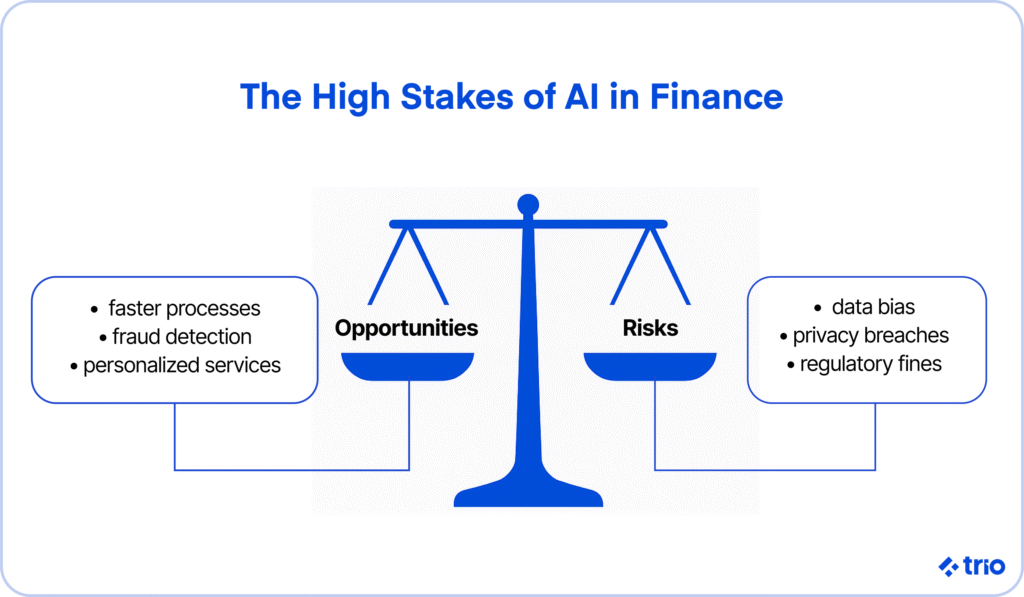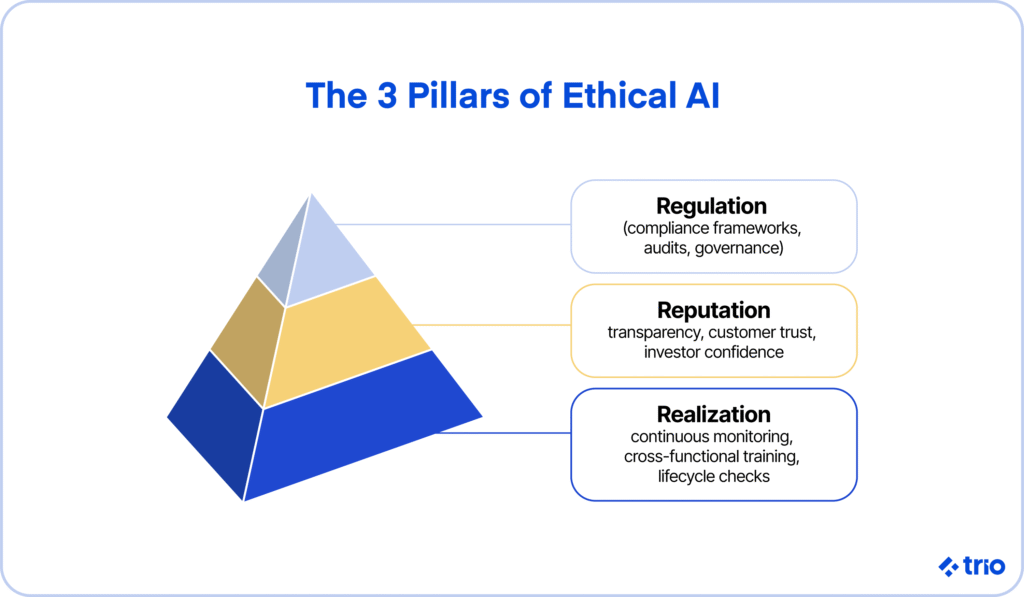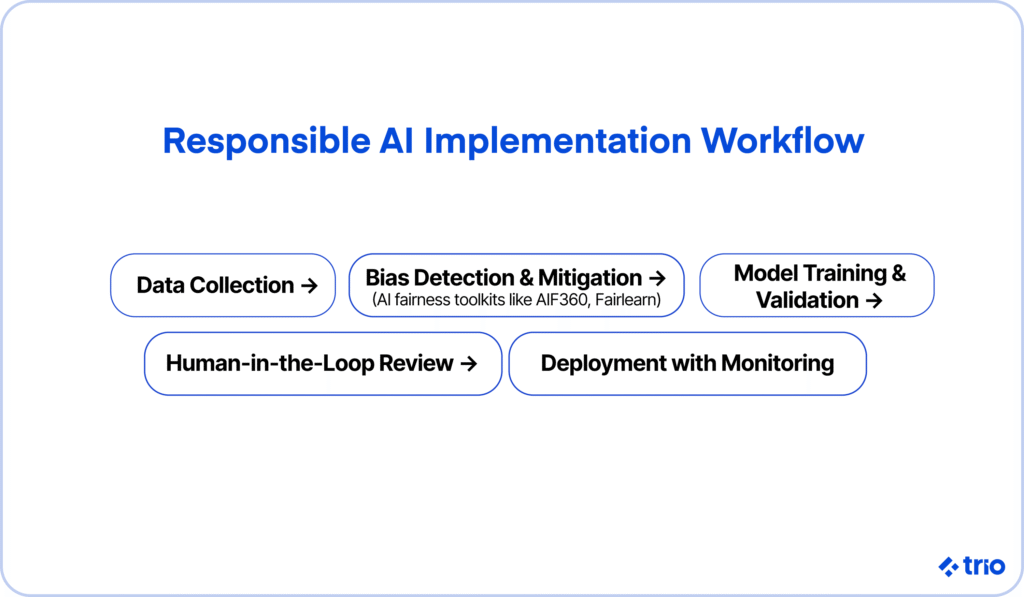Artificial intelligence has enabled us to automate various tasks, including risk management, fraud detection, and customer service. However, when you start automating decision-making or using AI in risk assessments within the financial services industry, ethical breaches and regulatory missteps could have a significant impact on your clients.
Responsible AI in fintech requires transparency, explainability, and even regular audits. These steps can help ensure that your models don’t contain any algorithmic biases that may affect services such as loan approval, thereby building trust with both your customers and investors.
Failing to use AI responsibly now also has serious consequences, including potential legal exposure and regulatory fines, depending on the region in which you operate.
As a CTO or technical leader, it is your responsibility to ensure compliance with the AI governance that you fall under. Since the hope is always to expand, you may need to prepare proactively.
One of the best ways to set yourself up for success in the future is to ensure that you have an experienced developer on your team who has worked with AI in the financial services sector before. At Trio, we provide fintech firms with the right people through staff augmentation and outsourcing, so you get all the skills you need without the commitment of a long-term hire.
But, before you look at hiring, let’s cover all of the information you need to know about AI adoption in the fintech industry, including some of the current use cases and the frameworks and tools fintech companies have turned to for mitigating AI risks.
Why Responsible AI Is Crucial in Financial Services
Considering why the implementation of responsible AI is so important is critical. When you know why you are doing something, you can better determine what is a reasonable amount of time and resources to commit to a project.
The High Stakes of AI in Finance
AI can significantly accelerate processes across various industries, including insurance, lending, wealth management, and payments, by enabling automation and analyzing large datasets in a fraction of the time. However, with the fantastic opportunities provided by AI-driven fintech come some incredible risks.
For AI technologies to provide value, they require access to sensitive data. In many cases, they will also deal with high-value transactions. Likewise, the decisions made in financial systems may have a direct impact on the lives of users.
If your models are biased in any way, the consequences will not only be highly detrimental to your users but also your organization. Still, they can also result in a loss of reputation and trustworthiness, which are critical in the financial sector.

Real-World Consequences of Biased Algorithms
The consequences of biased AI tools are too many to mention. However, we can examine some real-world examples, many of which our developers have encountered firsthand, to provide you with a better understanding.
Gender-based biases may appear. In 2019, an investigation began after users reported that the credit limits on Apple Cards were significantly lower for women than for men. Similarly, it is essential to be aware of race-based biases. Major technology companies are struggling with this in their facial analysis programs.
Since we know that biases in AI generally appear due to their training data, you have to be very careful when working with minority groups of any sort, as the lack of initial data may result in issues.
Legal, Ethical, and Reputational Risks
With increased AI use, regulators are becoming very stringent. The EU AI Act, U.S. Federal guidelines, and organizations like the CFPB are all focusing on promoting fairness and explainability, as well as curbing discrimination to foster financial inclusion.
Depending on the region in which you offer your financial technology and the financial regulators under which you fall, you may be faced with regulatory sanctions, class-action lawsuits, and a loss of reputation and customer trust, which we have already mentioned above.
All of this means that responsible AI practices are essential.
Understanding Bias in Financial AI Systems
As we have already mentioned above, machine learning models require training on an initial dataset.
This means that potential issues can arise if you have any historical biases in your decisions, such as those that may result from previous discriminatory policies, or if there is an issue with sample size and overrepresentation of any community. Label biases should also be considered.
Suppose you are using AI in financial services, such as credit scoring, loan approval, and fraud detection. In that case, you are particularly vulnerable to biases and should regularly audit your systems to ensure that all users have an equal opportunity to access them.
Be cautious when using generative AI models as well. Since these models are often trained on data scraped from the internet, it can be challenging to control their training. You may even find that they are training on inaccurate data generated by other models. Controlling as many variables in training as possible is key to reducing biases.
The 3 Pillars of Ethical AI in Fintech
AI ethics can be split into three different components: regulation, reputation, and realization.

Regulation
Regulatory bodies often view AI models as high-risk, which leads them to implement AI governance frameworks to mitigate potential issues.
You need to proactively integrate government programs into your AI development and take any other necessary steps, such as conducting audits and documenting datasets, model logic, and decision pathways to the extent possible. In doing so, you set yourself up for the most cost-effective opportunity to achieve global compliance.
Trying to implement responsible AI frameworks later can be difficult, especially if you are locked into an external vendor or need to have a certain amount of documentation to obtain a compliance certificate. The pressure is also not going to be as intense, meaning your developers will be less likely to make mistakes.
It’s also going to be far cheaper than any potential fines.
Reputation
Customer expectations continue to grow. And, in the fintech industry, trust matters above all. You would not want someone with a sketchy reputation to take care of your money, so don’t expect the same of the people around you.
One way to build trust and establish a strong brand reputation is to embrace transparency. Not only do you need to be honest about your AI implementation and how you are dealing with client data, but you also need to make sure that you can explain the approach the AI is taking in financial operations.
People want to know why their loan application was denied or what factors contributed to their transaction being flagged as fraudulent.
Increasing your reputation also has other benefits. Investor confidence is a significant factor, which we have already mentioned; however, partner onboarding and talent acquisition can also be equally beneficial.
Realization
Ethical AI deployment is rarely a one-time fix. You need to integrate checks into every part of your fintech development lifecycle, provide cross-functional training to your developers, and ensure that you have a review process in place to identify when things start to go wrong and catch the issue before it results in massive financial losses.
Everything, from the choice of your tech stack to your team and more, will also need to be considered if you want to create ethical and responsible solutions.
Frameworks and Tools to Detect and Mitigate AI Bias
Now that you have a reasonable understanding of the impacts that building trustworthy AI systems might have on your success, let’s take a look at the tools and frameworks you can use to pick up on issues quickly.
Auditing AI Models for Fairness and Accuracy
AI fairness toolkits have been developed by a few major players. Google has the What-If Tool, IBM has AI Fairness 360, and Microsoft has Fairlearn. All of these are being used by companies dipping their toes into artificial intelligence in fintech applications.
Many of these frameworks for responsible AI help visualize the model’s behavior. They also test for disparate impacts and help with debugging when issues appear.
The most effective way we have encountered to utilize these tools is to conduct scheduled audits at regular intervals, where you assess both performance and fairness.
Human-in-the-Loop Design for Accountability
Outside of these audits, we always recommend that our clients involve humans in the decision-making process, especially in high-impact decisions.
You could set this up so that humans spot-check the AI, or so that particular thresholds automatically trigger human review. It is also critical that you can always override AI decisions, so that you can adjust decisions manually if you notice any red flags cropping up.
Building Inclusive, Representative Data Sets
Try to make your AI models inclusive from the ground up. Curate the right training sets, expand your data sources, and even create artificial data to correct historical imbalances if you have to.
It’s a fine line, though. You want to ensure that your AI is not negatively affected by these inclusive datasets. You still want an accurate analysis. That should always be your primary focus.
Data Privacy and AI: Striking the Right Balance
One of the biggest concerns users have expressed regarding AI in banking and other fintech solutions is the risk it poses to their sensitive personal data, including how they manage their finances and even their biometric information.
If any of this data is mishandled, even the most ethical model will receive significant backlash, potentially ruining your reputation.
Techniques surrounding privacy and security are constantly evolving, but some of the more recent ones we’ve observed at Trio include differential privacy, federated learning, and synthetic data. The goal of these methods is to reduce the risk of exposing individual data while still allowing models to learn.
The most effective strategy we recommend to all our clients is to offer users clear, accessible choices for how their data is used. Ensure that they understand what they are agreeing to.
Building Trustworthy AI Systems: A CTO’s Guide

There are specific steps we help all our clients to ensure the successful building and integration of artificial intelligence that won’t negatively impact their business going forward.
Having a good understanding of these steps can help you plan effectively and identify additional talent at the right time.
Embedding Explainability and Governance from Day One
You need to establish an AI governance policy before you begin building. This policy should outline accountability, documentation, and even escalation procedures.
When creating this documentation, ensure that the right people are involved, including those with familiarity with compliance in the relevant regions.
Another great way to ensure everything is where you’d like it to be from day one is to provide your developers with all the necessary training and ensure that all the required tools are available for their use.
Choosing AI Partners Who Understand Regulation and Risk
If you are working with a partner, whether it’s a vendor or a staff augmentation firm like Trio, you need to consider their regulatory compliance in the fintech industry and whether they have their own responsible AI practices in place.
Consider how their models are trained, if they have been audited in the past, and where they have been successful before.
If you can’t find this information, it may be best to reconsider. We strive to be as transparent as possible, providing our clients with all the necessary details to inform their decision-making process. If someone else isn’t willing to do the same, there may be a reason for it.
Balancing Innovation Speed with Ethical Discipline
You need to develop quickly to keep up with market demands. However, ethical discipline is also essential. The key is to strike a balance between the two, building innovative and compliant systems.
The only real way to strike this balance is to build a company culture of deliberate innovation, with a focus on ethics. Have internal accountability systems in place, and reward developers who perform appropriately.
A leadership hierarchy may be key.
What’s Next: The Future of Ethical AI in Fintech
Understanding how the role of AI within the fintech sector is evolving can help you plan effectively, allowing you to focus on building compliance rather than feeling like you are always one step behind.
As a fintech-focused firm, our developers can immerse themselves in the industry, picking up on trends and making informed predictions that benefit our clients.
Based on recent developments, regulations are more important than ever, and compliance could open doors for small startups that even established enterprises might not be eligible for due to their failure to ensure security and data privacy.
Similarly, government bodies aren’t afraid to dish out massive fines, even to industry giants.
We expect all of this to lead to further progress in fairness-focused training, bias resilience, and privacy best practices. Everything we build focuses on nailing these basics to avoid building tech debt that is expensive and time-intensive to fix later.
If you are interested in hiring a specialist with numerous successful projects to showcase their skills, you are in the right place. We can connect you with the right person, who is familiar with the U.S. regulations, so that you can build quickly without any expensive missteps.
Ready to get started or need some more information? Reach out to schedule a free consultation!






